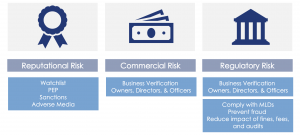Supplier Relationship Management isn’t necessarily a new concept, but in today’s COVID-related, digital climate, its scope and structure should be formalized and followed diligently. Instead of a transactional interaction and a contract that gets shoved in a filing cabinet until renewal, GEP states that the nature of the vendor/supplier relationships is shifting to just that: relational. Long-term. A constant conversation that lasts throughout the contract – not just at the endpoints. Now, of course in any relationship there is risk.
Without diligence or with diligence only executed at the endpoints, it is much harder to figure out where the relationship went wrong if problems occur. CNN reported that the HHS’ Assistant Secretary of Preparedness and Response misappropriated the millions of dollars allocated to the Biomedical Advanced Research for administrative and office expenses, dubbing it the Bank of BARDA. If misappropriation and mistakes can happen in an organization with that degree of oversight, they can happen anywhere.
Gaps in normalcy like shipping delays, business shutdowns, limited manufacturing capabilities, and a higher-than-average online population gives a fraudster the perfect opportunity to slide in. So how can you identify whether your supplier is one you can count on?
GDC agrees with the PWC categorization risks in a supplier relationship. The risks are broken up into five segments:
Reputational Risk
A reputational risk means your business’ brand is affected. This can happen when the end-user experiences a product failure or substandard quality as a result of a bad supplier.
Resilience Risk
Resilience risks affect the customer’s access to the product because of a bad supplier. This can happen if a crucial part of your product is missing, and you must deem it out of stock.
Data Security and Privacy Risk
63% of data breaches happen from third party access, so strict security measures should be enforced in order to prevent stolen customer, employee, or partner data.
Regulatory Risk
Regulatory risks happen when a business violates the country- or jurisdiction-specific compliance requirements for outsourcing or signing with a supplier.
Commercial risk
Commercial risk can happen when supplier failure results in inaccurate or over billing, or when the costs of the supplier partnership is larger than the profit.

Now that you know your risks, it is time to think about how to solidify your process for supplier management and risk prevention.
Luckily, there are a few best practices and guidelines out there to lay the groundwork.
Vendor Selection
This is where we come in. Global Data Consortium is a data-as-a-service company that delivers real-time, locally sourced business verification for financial institutions around the globe to combat reputational, regulatory, and commercial risks. When you use GDC’s Know Your Business solution, you can choose from three types of checks with varying levels of verification and customizable match rules to meet whatever level of compliance your organization requires.
The key to a successful supplier relationship is to never let the bad ones get to you in the first place. Whether you’re seeking to verify the legitimacy of a potential supplier, conduct a risk analysis, or confirm the beneficial owners and directors, GDC’s KYB solution helps you kick your supplier relationship management process off with a head start.
Contract
Setting a contract up with your supplier means setting expectations up with your supplier. Make sure both parties are aware of the duration of the partnership, quantity of work, and quality of service expected.
Vendor Management
As stated above, the nature of a supplier relationship is shifting. Monitor your partnership throughout the life of it and keep an open line of communication.
Contingency Planning
Even with all the precautions listed above, things can still go wrong. If a supplier falls through, have a backup plan so you can still avoid a resilience risk.
And there you have it! Although every organization has its own structure, these best practices should set the groundwork for what will be an exceptional supplier relationship management process.
Want to start your supplier relationship management process off on the right foot? Check out our page to learn more about how GDC’s Know Your Business solution can help you minimize Regulatory, Reputational, and Commercial risks for a supplier relationship you can be confident in.



0 Comments